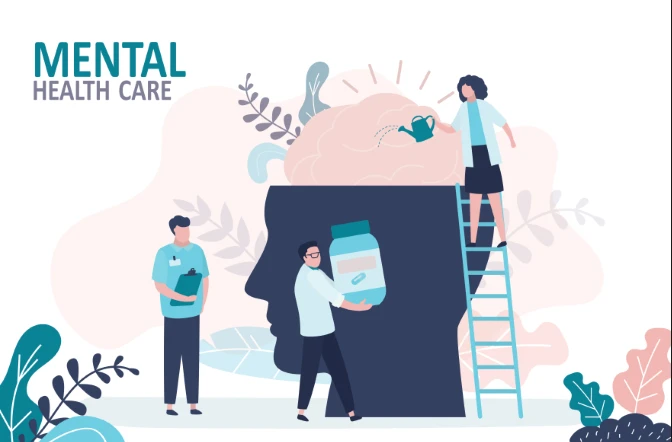Authored by Terrence Shenfield MS, RRT-ACCS, RPFT, NPS, AE-C
Introduction
It’s no secret that mental health plays a crucial role in our overall well-being, yet it often remains overlooked or misunderstood. This mental health guide aims to change that by offering a deep-dive into the practices, tools, and mental health resources that can empower individuals to lead fulfilling lives. Whether you’re seeking to improve your emotional well-being or exploring mental health support, this ultimate wellness guide explores actionable steps and valuable tips to help you prioritize your mind and body.
By the end of this guide, you'll walk away with a clear understanding of how to nurture mental wellness while utilizing effective resources for support.
Why Mental Health Matters
Mental health isn’t just about avoiding illness; it’s about thriving and finding balance in life. Neglecting your emotional well-being can lead to physical health issues, strained relationships, and decreased productivity. The World Health Organization (WHO) estimates that depression and anxiety cost the global economy $1 trillion annually in lost productivity.
Addressing mental health proactively, therefore, is not a luxury but an essential investment in overall well-being.
Benefits of a Mental Wellness Routine
Establishing a mental wellness routine has profound benefits, including:
- Enhanced emotional balance: Regular practices like mindfulness and gratitude can improve resilience against stress.
- Improved physical health: Mental health and physical health often go hand in hand. Activities like meditation reduce cortisol levels, supporting heart health.
- Stronger relationships: Emotional self-regulation helps nurture better interactions with friends, family, and colleagues.
- Personal growth: Gaining clarity about your emotions fosters self-awareness and decision-making skills.
To learn more about improving your mental well-being, visit ATECAM’s Mental Health Resources.
5 Core Pillars of Mental Well-Being
1. Physical Health and Nutrition
Your body and mind are intricately connected. Eating nutrient-rich foods supports brain health, while regular exercise releases endorphins that boost your mood.
Actionable Tips:
- Incorporate 30 minutes of moderate exercise into your daily routine.
- Choose omega-3-rich foods like salmon or flaxseeds to counteract inflammation associated with mental stress.
- Stay hydrated to optimize brain function.
2. Sleep Hygiene
Lack of sleep can exacerbate anxiety, depression, and stress. Prioritizing sleep hygiene fosters recovery and mental clarity.
Actionable Tips:
- Aim for 7-8 hours of quality sleep every night.
- Establish a calming bedtime routine with practices such as reading or meditation.
- Limit screen time before bed, as blue light disrupts melatonin production.
3. Social Connection
Strong relationships can act as a safety net during challenging times. Surrounding yourself with supportive people fosters emotional wellness.
Actionable Tips:
- Allocate time each week to connect with loved ones, whether virtually or in person.
- Participate in social activities that align with your interests, such as community groups or hobby clubs.
- Join online mental health support groups via resources like ATECAM’s health platform (Explore Now).
4. Mindfulness Practices
Mindfulness involves being present and intentional in your actions, which can help manage feelings of stress and overwhelm.
Actionable Tips:
- Practice 10 minutes of mindfulness meditation each morning to center yourself.
- Use guided meditation apps or resources from ATECAM’s wellness guide for easy incorporation into your routine.
- Pair mindfulness with gratitude practices by journaling three positive things daily.
5. Access to Mental Health Resources
Never underestimate the value of professional guidance. Therapy or counseling provides a safe space to work through challenges, while self-help materials offer additional tools for managing emotional issues.
Actionable Tips:
- Look into licensed therapy platforms like BetterHelp or Talkspace for accessible, online counseling services.
- Explore support groups that meet your specific needs (e.g., anxiety management groups).
- Bookmark helpful resources such as ATECAM’s mental health page (Visit Here).
Building a Personalized Wellness Plan
Creating your own mental wellness routine doesn’t require drastic changes. Start small, integrate practices that align with your lifestyle, and adjust as you grow.
Step-by-Step Guide
- Reflect on Your Current Needs
Identify which areas need immediate attention. Is it sleep, stress management, or social connection?
- Set Achievable Goals
For example, begin by adding a 15-minute walk to your daily schedule or limiting social media scrolling before bed.
- Track Your Progress
Use journals or mental health apps to monitor improvement and note areas needing adjustment.
- Celebrate Wins
Acknowledge and reward yourself for every step, no matter how small.
By combining practices from this mental health guide with structured resources like therapy, building a strong foundation for emotional and physical health becomes achievable.
Creating a Community of Care
Improving mental health doesn’t have to be a solo mission. Engaging with a community of like-minded individuals can amplify these efforts. ATECAM’s initiatives provide opportunities to connect, whether through sharing knowledge or participating in events.
Empower Your Mental Wellness Journey with ATECAM
Your emotional well-being is worth every effort. With access to premium mental health resources and a supportive community, ATECAM is here to guide you every step of the way.
Think it’s time to prioritize your mental wellness? Start exploring trusted tools and expert-backed information by visiting ATECAM today.
References
- World Health Organization (2021). “Mental health and productivity statistics.”
- ATECAM. (n.d.). Mental Health Resources.
- National Institute on Mental Health (NIMH). “Cognitive tools for emotional well-being.”
- Harvard Medical School. (2022). “Benefits of mindfulness in mental health.”
- BetterHelp. “How online counseling transforms emotional management.”



